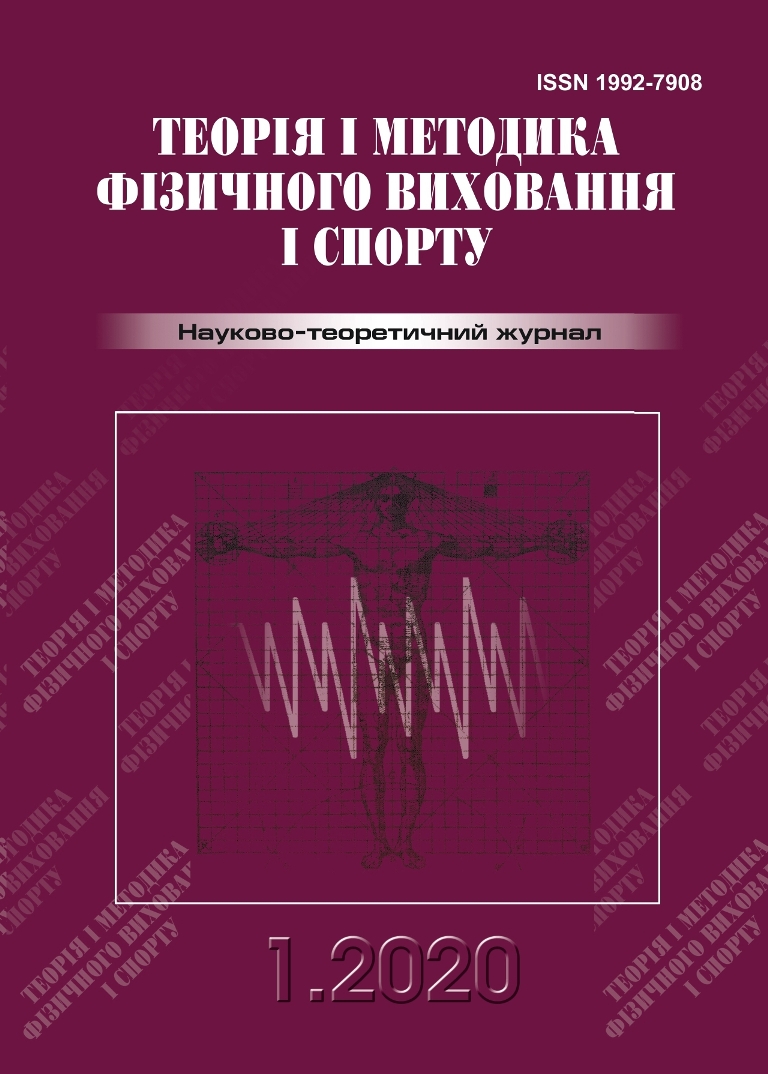УПРАВЛІННЯ ПІЗНАВАЛЬНОЮ ДІЯЛЬНІСТЮ СТУДЕНТІВ У ІНФОРМАЦІЙНО-ОСВІТНЬОМУ СЕРЕДОВИЩІ ЗАКЛАДУ ВИЩОЇ ОСВІТИ З ФІЗИЧНОЇ КУЛЬТУРИ І СПОРТУ
DOI:
https://doi.org/10.32652/tmfvs.2020.1.49-54Ключові слова:
інформація, освіта, технологія, знання, діяльність, потік, циркуляція, управління, взаємодія, мережа, передачаАнотація
Анотація. Виявлено, що ефективність управління пізнавальною діяльністю учасників освітнього процесу безпосередньо залежить від ступеня поширення новітніх методів і прийомів передачі знань, технічних і технологічних нововведень, якості електронних освітніх ресурсів та готовності науково-педагогічного складу здійснювати професійну діяльність в умовах розвиненого інформаційного суспільства. Встановлено, що вдосконалення освітнього процесу в закладах вищої освіти з фізичної культури та спорту ґрунтується на новітніх способах взаємодії суб’єктів освітнього процесу в рамках інформаційно-освітнього середовища закладу вищої освіти з фізичної культури та спорту.Мета. Дослідити механізми взаємодії між суб’єктами освітньої діяльності в інформаційно-освітньому середовищі закладу вищої освіти з фізичної культури та спорту в процесі управління пізнавальною діяльністю студентів.
Методи. Вивчення, аналіз, систематизація й узагальнення науково-методичної літератури та передового педагогічного й власного досвіду.
Результати. Визначено, що спортивно-педагогічна інформація циркулює в закладі вищої освіти в цифровому вигляді, а до її характерних рис віднесено зв’язок із фізкультурно-спортивною діяльністю, спрямованість на висвітлення аспектів розвитку фізичної культури та спорту, сконцентрованість на фізичних здатностях людини в русі. Розроблено схематичну модель трансляції знань, досліджено процес управління пізнавальною діяльністю студентів у рамках інформаційно-освітнього середовища закладу вищої освіти та визначено умови ефективного управління пізнавальною діяльністю студентів.
Посилання
Bomba А, Nazaruk М, Pasichnyk V. Designing a diffusion-like model of the information process of dissemination of knowledge potential. Visnyk natsionalnoho universytetu «Lvivska politekhnika». 2014; 800: 35-44.
Iermakov S. Status and prospects of development of scientific information space in higher educational institutions of physical culture. Теоriia і metodyka fizvykhovannia і sportu. 2006; 3: 89-93.
Law of Ukraine on information. 1992. – N 48. – 650 p. – Access mode: https://zakon.rada.gov.ua/laws/show/2657-12 4. Ivanova ОМ. Characteristics and classification of information flows of enterprises. Еkonomichna nauka. 2016; 13: 18-22.
Ivanova OM. Characteristics and classification of enterprise information flows. Ekonomichna nauka. 2016; 13: 18–22.
Ivashchenko МV, Bykova ТB. Features of the use of mixed learning elements in teaching of academic disciplines in higher education institutions. Fizyko-matematychna osvita. 2018; 1(15): 221-6.
Кіzim SS, Кutsak LV, Liulchak SI. Information and educational environment as a means of modernizing the training of future professionals. Fizyko-matematychna osvita. 2017; 4(14): 37-42.
Коbysia АP. Information educational environment as a platform for the implementation of mixed learning in higher education institutions. Informatsiyni tekhnolohii і zasoby navchannia. 2017; 1: 75-82.
Ludtsev КB, Lygina NI. Development of information system for the design of individual educational trajectories. Sovremennaya tekhnika i tekhnologiya. 2016; 5 [Еlectronic resource]. URL: http://technology.snauka.ru/2016/05/10042
Liubarets VV. Theory and practice of professional training of future managers of socio-cultural
activities in the information and educational environment [аuthor’s abstract]. 2019, Кyiv. 46 p.
Маzurok ТL. Моdel for knowledge formation for automated system of education management. Оbrazovatelnyye tekhnologiyi i obshchestvo. 2013; 16(1): 737-762.
Svistelnik IR. nformation support of professional education in the field of physical culture and sport of the former CIS countries. Slobozhanskyi naukovo-sport. Visnyk. 2016; 2(52): 107-111.
Svistelnik IR. System of scientific sports information: formation, development, prospects. Теоriia і metodyka fizvykhovannia. 2005; 4: 2-5.
Sokurenko VV. Designing information and educational environment in higher education institutions with specific learning conditions. Public administration of the XXI century: world practices and national perspectives., 2018. 467-71.
Тytenko ОА. Information and knowledge as key concepts of modern political economy. Naukovyi chasopys Natsionalnoho pedahohichnoho universytety imeni М. P. Drahomanova. 2015; 28: 43-50.
Тоpuzov МО. Designing the information and educational environment of educational institutions in modern society. Ukrainskyi pedahohichnyi zhurnal; 1: 26-36.
Us HО. Modeling of knowledge transfer processes in the system of distance education in higher educational institutions: [Еlectronic resource]. 2014; 7. – Access mode: http://nbuv.gov.ua/-UJRN/efek_2014_7_30
Khodakov VЕ, Коzel VN, Sokolov АЕ. Mathematical model of information flows representation in the form of oriented graphs and their transformation. Issues of information technologies. 2016; 20: 73-83.
Shelestova АМ. Online services as promising and alternative means of teaching students of Ukrainian universities. Bibliotekoznavstvo. Dokumentoznavstvo. Informolohiia. 2018; 2: 23-29.
Shynkaruk ОА, Byshevets NH, Iakovenko ОО, Kharchenko LА. Information and educational environment in the system of training specialists in physical education and sport. Fizychna kultura, sport ta zdorovia natsii. 2019; 8(27). 367-374.
Atanasyan S. Methodology development and use of the information educational environment during the preparation of pedagogical high school students. Voronezh: scientific book, 2009. 152 p.
Aydar M. Kalimull, Zulhiza I. Islamova. Formation of Information – Educational Environment in the Partner Universities of University of Shanghai Cooperation Organization. Mathematics education. 2016; 11(6): 1879-90.
Islamova ZI. Modernization processes of the university development in the context of integration of informatization and internationalization of vocational education. Teaching Bashkortostan journal. 2014; 1: 24-33.
Lee EA. The Problem with Threads. IEEE Computer. 2006; 39(5): 33-42.
Segev El. Google and the Digital Divide: The Biases of Online Knowledge. Oxford: Chandos Publishing, 2010. 171 р. 25. Yavich R, Starichenko B. Design of Education Methods in a Virtual Environment. Journal of Education and Training Studies. 2016; 5(9): 176-86.
##submission.downloads##
Опубліковано
Номер
Розділ
Ліцензія
Авторське право (c) 2020 Теорія і методика фізичного виховання і спорту

Ця робота ліцензується відповідно до Creative Commons Attribution 4.0 International License.

